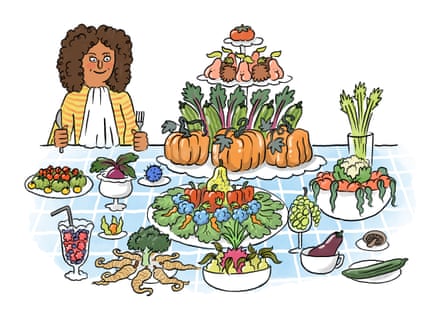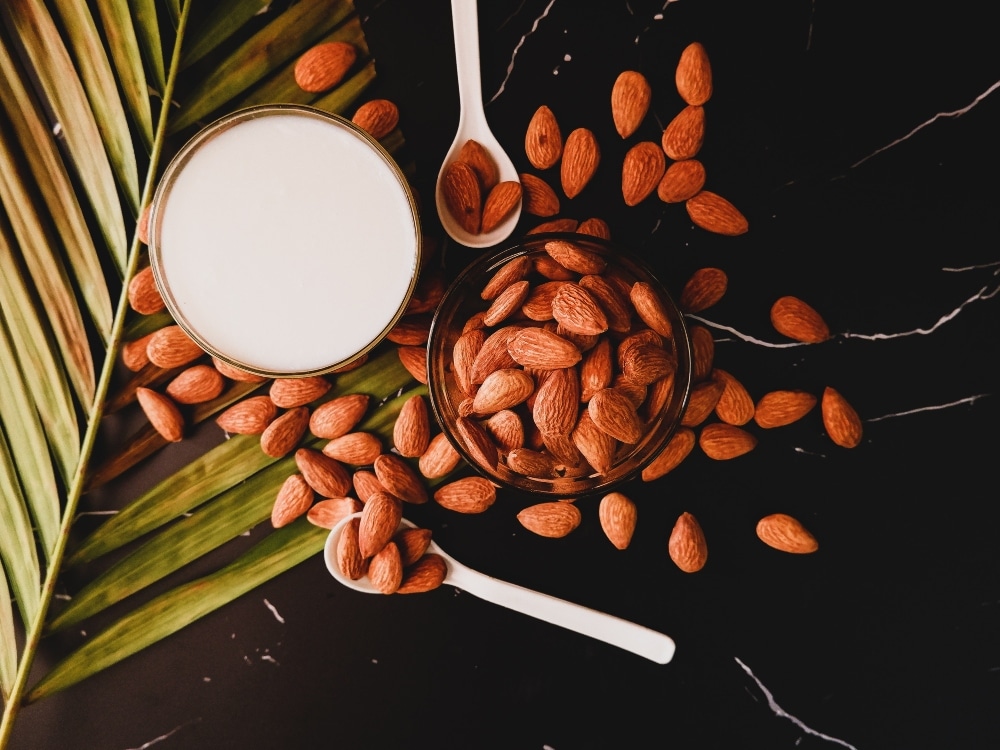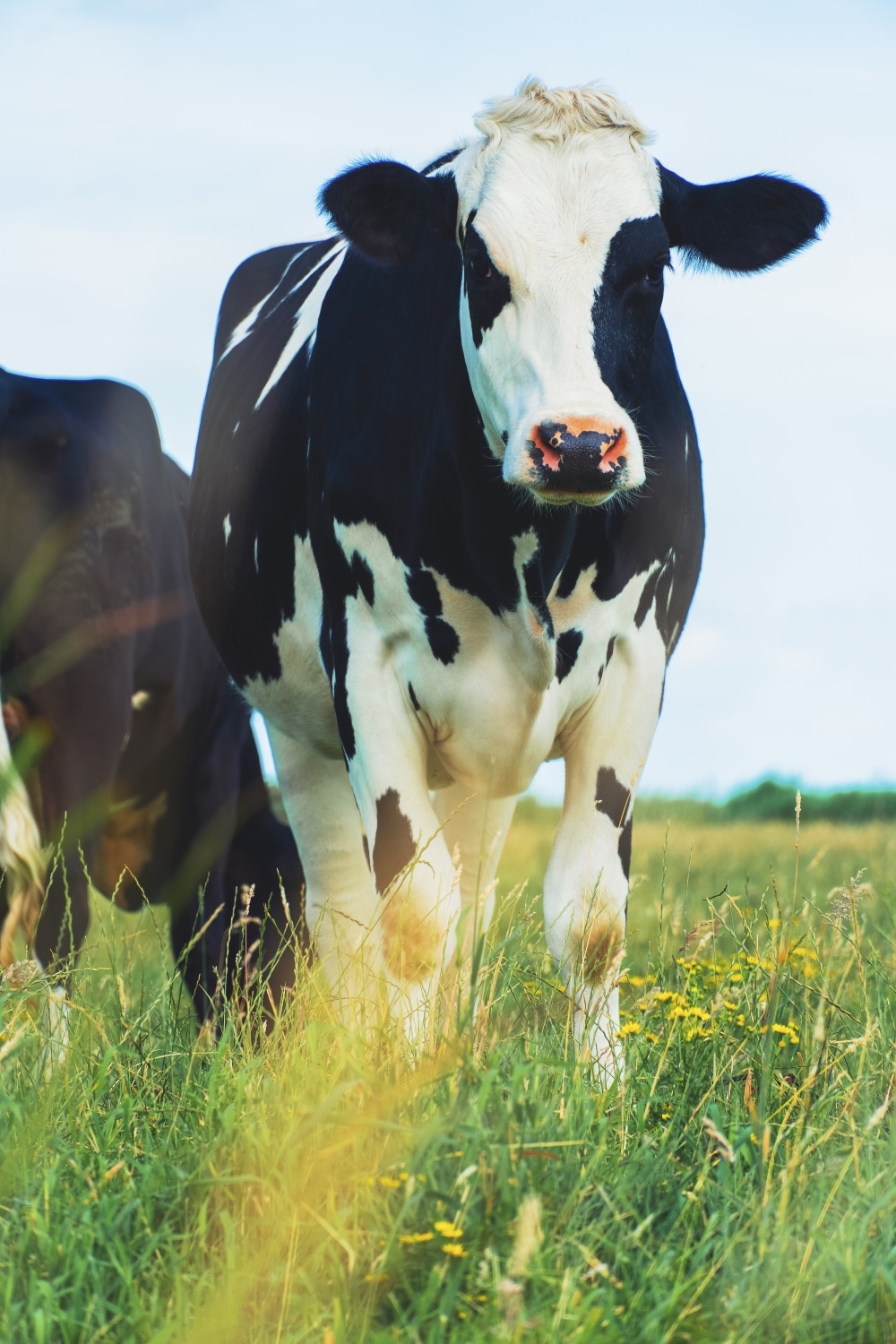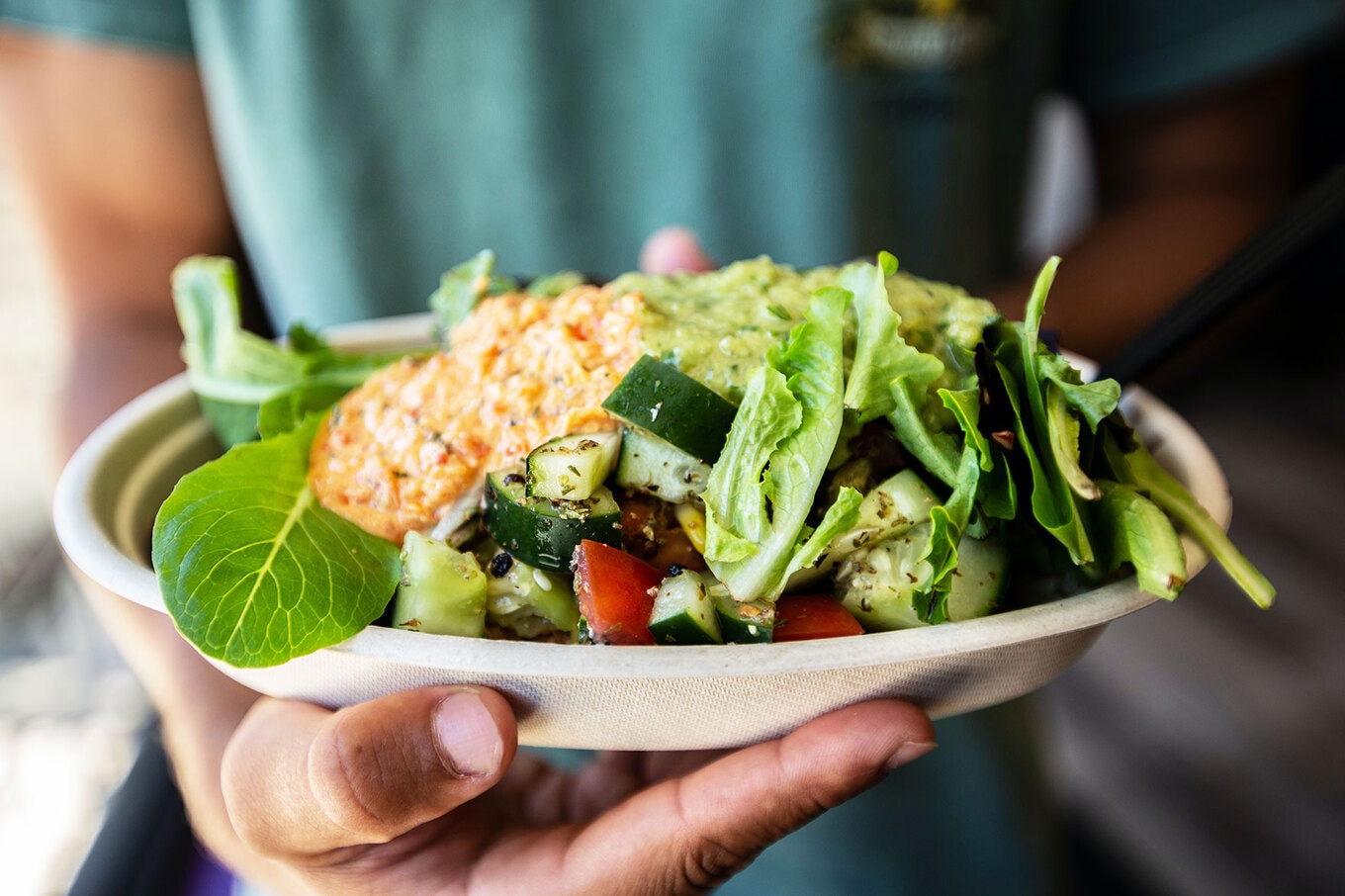From theguardian.com
Veganism: boring and expensive but always the most ethical choice, right? Wrong, say our experts, who tackle misconceptions about plant-based eating
You can’t build muscle on a vegan diet
FALSE
While plenty of vegan athletes and bodybuilders share their diets online, some elite sports people find they need to add animal products to their previously strict plant-based regimes. Venus Williams calls herself a “chegan” (cheating vegan) and Novak Djokovic reportedly started eating fish to help his muscles recover after elbow surgery.
“Protein is something vegans need to think about” says Reena Sharma, AKA the Vegan Dietitian, who has been vegan for six years. “But most people in the west, vegan or not, exceed their protein requirements anyway.” Plant-based foods don’t usually contain all nine essential amino acids – the building blocks for muscle growth, which also play a role in immune, digestion, hormone and neurological systems. “But combined with other plant foods – like a peanut butter sandwich or hummus with pitta – they can.”
Illustration by Edith Pritchett for the GuardianHumans are designed to eat meat
TRUE
But we’re also designed to eat plants. “Humans have been omnivores since the beginning of time because we can digest both plants and animals,” says Sharma. “However, we don’t have typical carnivore features such as sharp teeth and claws, potentially indicating we are more suited to plants.”
Vegan options are always healthiest
FALSE
“Once, that probably was true,” says Dr Chris van Tulleken, author of Ultra-Processed People: Why Do We All Eat Stuff That Isn’t Food … and Why Can’t We Stop? “Now, it’s very often not. A vegan diet can be very healthy. If we compare two meals prepared in a domestic setting with fresh ingredients, the vegan one will often be healthier because it is likely to contain more vegetables and less saturated fat. But many modern vegan foods, like sausage rolls and burgers, are seen as healthier than their meat equivalent, whereas I’d say they’re just as bad. They’re high in salt, often high in sugar and fat, and contain additives that, according to some evidence, are harmful.”
Being vegan is good for the environment
TRUE
“The science is clear,” says Rob Percival, head of policy at the Soil Association and author of The Meat Paradox. “The average vegan diet does less harm to the environment than the average omnivorous diet, and will typically have a smaller land use footprint and contribute less to global heating.” What about fruits and vegetables grown on deforested land, like coconut, soy, avocados and almonds? “Fruits and vegetables can, in the wrong context, exhaust soils, exacerbate water shortages and rely on fossil energy.”
Nonetheless, most foods in the average plant-based diet will still be comparatively environmentally friendly, he says: “Two-thirds of the meat consumed in the UK is intensively farmed, where animals live in poor conditions and are fed on crops grown using industrial agrochemicals. The waste produced often contributes to nutrient pollution, killing our rivers. The miserable conditions animals endure can lead to zoonotic diseases and antimicrobial resistance.”
Vegan food is the more ethical choice
FALSE
Not necessarily, says Alicia Kennedy, author of No Meat Required: The Cultural History and Culinary Future of Plant-Based Eating. “I think a lot about things like cashew cheese. Producing cashews often involves terrible working conditions. It’s both troubling and counterproductive that some vegans will like anything so long as it’s vegan. Human rights abuses don’t come into it.”

Illustration by Edith Pritchett for the Guardian
Vegan food is boring
FALSE
“Plant-based eating is incredibly diverse,” says Ian Theasby, co-founder of Bosh!, a popular plant-based online channel, cookbook and food brand, who has been vegan for 10 years. “Eating out as a vegan is easier than ever – there’s been a noticeable surge in restaurants offering vegan options.”
Chef Chantelle Nicholson is famous for her plant-based cooking at Apricity in London, where menus include fig-leaf panna cotta and miso-roasted cabbage with sambal slaw. “We recently cooked at Wilderness festival”, she says. “Five of the courses in our seven-course tasting menu were totally plant-based, and I’m not sure any of the guests noticed.”
A vegan diet is bad for children
FALSE
“A well-planned vegan diet can support people at every stage of life,” says Chloe Hall of the British Dietetics Association. However, research by University College London showed that while, on average, vegan children have lower “bad” cholesterol, they are also 3-4cm shorter than their omnivorous peers, with 4-6 % lower bone density (probably due to lower calcium intake) and a higher chance of B12 deficiency.
As with all such studies, averages are useful only up to a point. Whether a child (or adult) thrives on a vegan diet is individual and contextual, depending on their openness to vegetables, legumes or tofu, and the capacity parents, carers and schools have for meal planning and prep.
Being vegan is expensive
MOSTLY FALSE
“People think eating plant-based foods means buying plant-based products, as though if you’re vegan, you have to buy Impossible burgers, Beyond sausages and vegan eggs, rather than simply eating most of the foods human beings eat anyway,” says Kennedy.
Recent research by Which? showed that many supermarkets charge a premium for their plant-based versions of ready-made foods, with vegan sausages costing up to twice as much as meat, burgers 20p-30p more per 100g and vegan mayo up to 50% more. “That does a disservice to veganism and gives it a reputation for being expensive and inaccessible.” Some vegans report needing to eat more, and more often, which can get expensive. There are dozens of Reddit threads from new vegans asking for advice on how to feel full.
Plant milks are bad for you
FALSE
“Plant milks do have a hierarchy,” says Sharma. “If you’re looking for those that most resemble cow’s milk in terms of protein, soy is the best. The level of processing varies – some are made with just water plus the bean, grain, seed or nut, but others will contain additional ingredients such as sweeteners, flavours and stabilisers. None of these is bad for you, but limit your intake of those with added sugars.”
Pets can easily be fed vegan food
UNCLEAR
While dogs are omnivores, cats are obligate carnivores: they can digest plants, but can’t get all the nutrients they need from them. “Research suggests it’s not possible to form a complete vegan or vegetarian diet for cats,” says Anna Judson, president of the British Veterinary Association.
Regulators recently gave permission for a company called Meatly to put its lab-grown meat in pet food for the first time.
Vegans need to take supplements
FALSE
“A vegan diet is likely to be low in vitamin B12, iodine and selenium, so it is important to eat foods fortified with these or to supplement in adequate amounts,” says Hall. B12 is found in fortified cereals, iodine in seaweed and selenium in brazil nuts, tofu and some legumes.
“Iron from plants is not efficiently absorbed by the body, so with a poorly planned vegan diet, a lower intake is more likely,” says Sharma. “But our bodies are good at adjusting, and the less we have stored in the body the more we can absorb from food.”
Calcium is another worry: Hall says vegans should eat plenty of “calcium-fortified plant-based dairy alternatives, calcium-set tofu, fortified breads and cereals, and vegetables like okra and watercress.”
Female vegans should be careful about soy
PROBABLY FALSE
In the late 1990s, concerns started to grow about the potential oestrogenic and anti-oestrogenic effects of soy isoflavones, particularly in relation to breast cancer and mainly after animal and in vitro studies. Studies and counter studies on humans have since looked at its effect on cholesterol, heart health, dementia, the thyroid and cancer. The consensus today is that eating soy is probably not linked to breast cancer, and may even be protective; that any hormonal impacts (which are still not well understood) depend on the amount of oestrogen already in your body, and your age; and that any impact on health will still be either positive or neutral.
“So the opposite may be true,” says Hall. “Some research that looks at soy during menopause, has indicated that it may help to reduce hot flushes and the risk of osteoporosis.”
Vegans can’t drink beer or wine
FALSE
“If this were true, I would be gutted,” says Sharma. “Fortunately, it’s not. A lot of beer, cider and wine is filtered using fish bones or swim bladders, egg whites or gelatine, but there are many vegan alcoholic drinks, and they’re getting much easier to find – thank goodness.” Vegan drinks generally say so on the label (almost all spirits are vegan).
Vegan leather is the most sustainable choice
IT’S COMPLICATED
Although vegan leather has a lower carbon footprint, it’s often made from plastics like polyurethane or PVC. Some critics say the reframing of petroleum-based materials as greener than natural ones has been one of fast fashion’s greatest achievements. That said, animal leather production has a high carbon footprint and causes water pollution, but then plastic leather doesn’t biodegrade and can release microplastics.
One solution could be plant-based leathers, made from pineapple, mango, cactus or corn, but they’re so new there’s little data on their sustainability, and they can be expensive. Better maybe to reuse (rather than recycle) existing materials: Inflatable Amnesty makes colourful totes and bumbags from pool toys and paddling pools; Crackpacs turns old tents and adventure gear into backpacks; and Elvis & Kresse uses old fire engine hoses and leather discards (from Burberry) to make high-end laptop cases, wallets and belts.
https://www.theguardian.com/lifeandstyle/2024/sep/28/vegan-plant-based-myths-busted-by-experts





